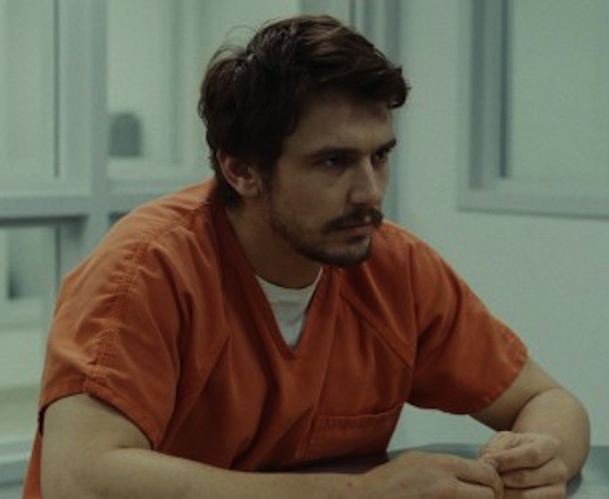Film Review: “True Story” — A Failed Whodunit
True Story relies far too heavily on answering the formulaic question ‘Did he do it?’

James Franco in a scene from “True Story.”
True Story, directed by Rupert Goold. At cinemas around New England.
By Paul Dervis
Michael Finkel’s memoir of his time spent with accused murderer Christian Longo has been brought to the screen with the assistance of novice feature film director (as well as first time co-writer) Rupert Goold in the painfully simple and awkwardly written True Story.
In Cold Blood it is not.
The premise starts with a major flaw, a ham-fisted gambit for self-pity. Finkel is determined to make himself a sympathetic character. An influential writer for the New York Times, he has just returned from Africa. His piece on at-risk children is a cover story, but it turns out that the article is filled with fabrications. He loses his job and ends up back in Montana to lick his wounds and resurrect his destroyed career. Poor Michael Finkel.
Enter Longo. Accused of murdering his wife and three small children, he fled to Mexico and, using Finkel as an alias, is apprehended and brought back to Oregon to face trial. When the reporter hears how Longo assumed his identity, he is curious as to why and arranges a meet up with the accused. Seems as if Longo is a long time admirer of his work.
They form an uneasy friendship — the payoff is that Finkel lands an exclusive.
I guess the re-branding worked. After all, we got the book and we now have the movie.
Comparisons to In Cold Blood are obvious. Truman Capote’s book (which was turned into a terrific film) was riveting. Arguably it is the best work Capote ever produced, a gritty true-crime narrative elevated, through craft and art, into a haunting tale that posed questions that could not possibly be answered. And therein lies the value of that masterpiece.
True Story, on the other hand, relies far too heavily on the formulaic question ‘Did he do it?’ and, to a lesser extent on ‘Am I being played?’ In the grand scheme of things this kind of police blotter speculation does not generate particularly deep or thoughtful musings. And it is hard to get past the fact that our author sits smugly at the center of the story…not the accused, but the narrator of this ‘true story.’ Finkel’s self importance is uppermost here.
The performances are solid, if not inspired. Jonah Hill, much more identified with comedy than drama, gives a thoughtful portrayal as Finkel. For an actor who is adept at ‘over the top,’ he is refreshingly subtle. And, though he is not supported by the script, he does his damnedest to suggest that there are depths to Finkel.
James Franco, much like the title character in his breakthrough film James Dean, does much of his acting with his face, minimizing the dialogue. He hints at complexities in Longo that, unfortunately, are never explored. Felicity Jones has a small but seemingly important role as Finkel’s wife and moral compass. She effectively anchors his reclusive home life, but when given what portends to be the most dramatic scene in the film, she and the dialogue fall flat.
The failure of True Story lies at the feet of the two co-writers, Finkel himself and his partner-in-Hollywood-crime, Goold. They promise the enticements of a psychological mystery story, a nerve-biting glimpse into the American heart of darkness, but they don’t deliver any complexity or suspense. Those who expect to be sitting on the edge of his or her seat, waiting for a shoe to drop, will be disappointed. The pair clearly want puzzled viewers to go back and forth, wondering whether or not Longo was guilty of the heinous crime. But there is no need for an investigative reporter to figure out whodunit — anyone who ever watched Murder She Wrote should be able to figure it out.
Paul Dervis has been teaching drama in Canada at Algonquin College as well as the theatre conservatory Ottawa School of Speech & Drama for the past 15 years. Previously he ran theatre companies in Boston, New York, and Montreal. He has directed over 150 stage productions, receiving two dozen awards for his work. Paul has also directed six films, the most recent being 2011’s The Righteous Tithe.
Tagged: James Franco, Jonah Hill, murder mystery, Paul Dervis, Rupert Goold
